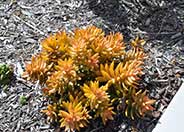
Common name:Orange Sedum
Botanical name:Sedum nussbaumeranian
This succulent perennial will grow best in a wall pot or hanging basket due to its long stems. It has light, gray green leaves that grow over one another to give off a "braided" look. The flowers are pink to deep red and bloom in spring and summer.
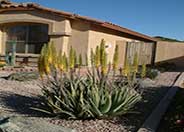
Common name:Aloe Vera or Medicinal Aloe
Botanical name:Aloe vera
The rosette of this plant consists of fleshy gray green leaves, which are narrow, succulent and erect with soft spines on margins. This Aloe is a slow to moderate grower. Flowers are spikes of yellow, 2'-3' tall and bloom late winter to summer. This aloe can form large clumps. It will tolerate full to partial sun, needs some supplemental water in heat and good drainage. It attracts hummingbirds. This aloe is a Mediterranean native. The sap is used for burns and abrasions.
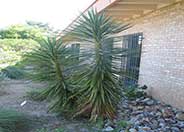
Common name:Gloriosa Yucca, Spanish Dagger
Botanical name:Yucca gloriosa
This clumping palm relative will reach 10' to15' tall and has large, green, sword-like leaves with white flowers in spring and summer. Its broad, medium green leaves blend with either tropical or desert theme landscapes.
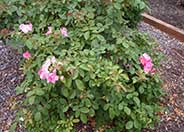
Common name:Shrub Rose
Botanical name:Rosa Shrub varieties
The dark green, heavily veined leaves of this bushy shrub are strong support for the pure white or pink, nearly double flowers it produces. This is a very tolerant, heavily scented plant with an impressive fall color. Also, large hips appear intermittently with this plant.
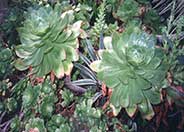
Common name:Aeonium cultivars
Botanical name:Aeonium cultivars
These plants are one of the most useful succulents, due to their decorative effects and sculpturesque quality. The branched stems hold a wide rosetta of either light green or purple leaves. The flowers appear in long, clustered form. They need some shade in hotter areas. Prostrate forms are low-growing, and spreading.
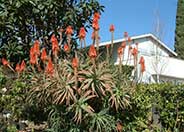
Common name:Tree Aloe
Botanical name:Aloe arborescens
This shrub is large, full of branches and produces deep orange blooms. The flowers produce a nectar that is attractive to many different birds; this plant is grown all over the world.
Designer: N/A
Photographer: GardenSoft
Practice grass-cycling by leaving short grass clippings on lawns after mowing, so that nutrients and organic matter are returned to the soil.
Develop healthy soil for plants that are vigorous and naturally pest-resistant.